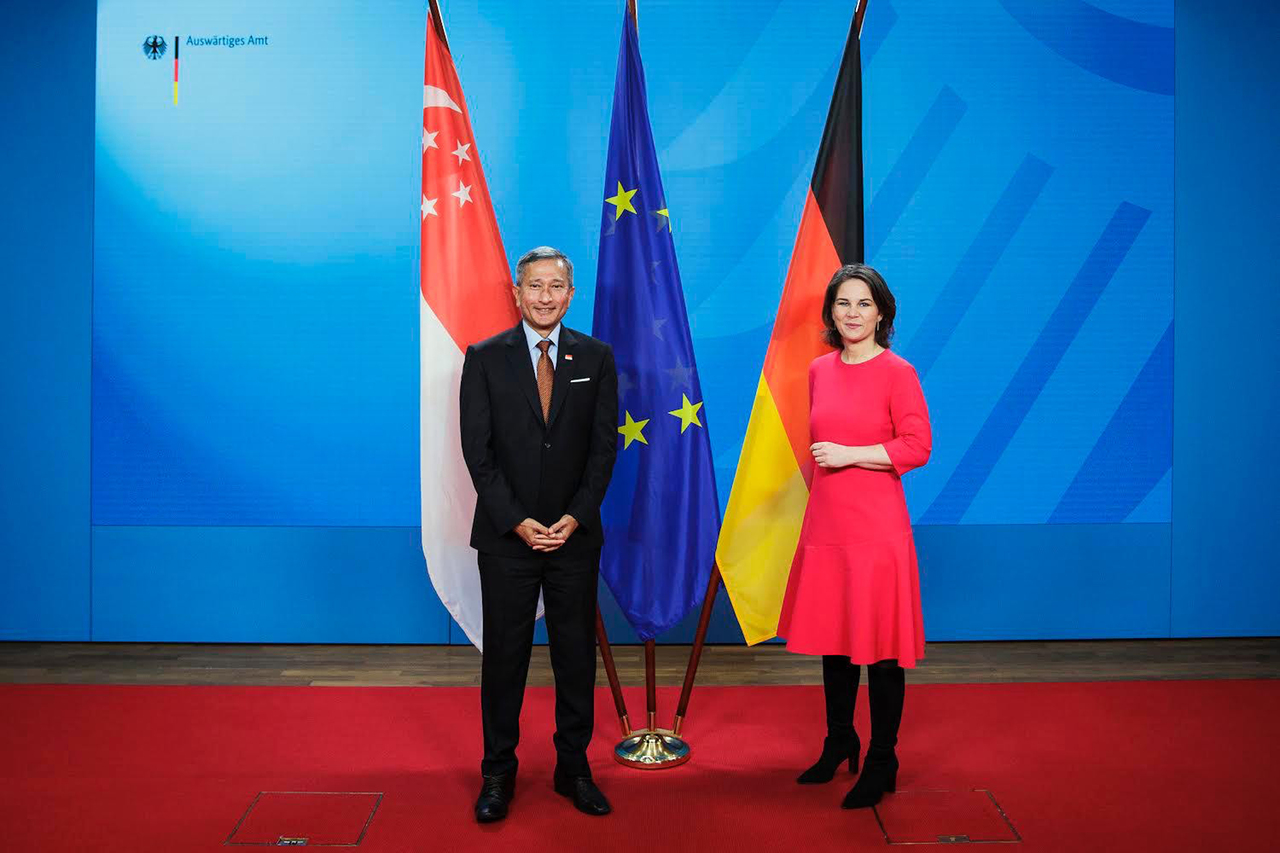Singapore has discussed 'very painful' Ukraine situation with Germany, hopes for immediate ceasefire: Vivian
Sign up now: Get ST's newsletters delivered to your inbox

Minister for Foreign Affairs Vivian Balakrishnan and German Federal Foreign Minister Annalena Baerbock in Berlin on April 4, 2022.
PHOTO: MINISTRY OF FOREIGN AFFAIRS
Timothy Goh
Follow topic:
BERLIN - Singapore has discussed the "very painful" situation in Ukraine with Germany, and hopes for an immediate ceasefire, Minister for Foreign Affairs Vivian Balakrishnan said at a press conference in Germany on Monday (April 4).
Speaking at the German Federal Foreign Office in Berlin, where he had just met German Federal Foreign Minister Annalena Baerbock, Dr Balakrishnan said that although Singapore is far away from the conflict, it believes in certain fundamental principles.
These are the principles of territorial integrity, respect for the independence and sovereignty of nations, and of freedom from the threat of being attacked by other nations - all of which are enshrined in the United Nations (UN) Charter, said Dr Balakrishnan.
"To us, these are essential pillars for peace and prosperity in the world. That is why although we are a tiny city state far away from Europe, we decided that we needed to take a stand. Not take sides, but to take a stand on principle," he said, pointing out that Singapore has strongly condemned the invasion of Ukraine by Russia, and imposed sanctions to constrain Russia's capacity to conduct war against Ukraine.
"The people of Ukraine deserve so much more than has been visited on them in the last six weeks. We hope there will be a peaceful resolution, in accordance with the UN Charter and international law. There must be safe and unhindered access for humanitarian assistance to Ukraine and those most directly affected by the crisis," said Dr Balakrishnan, adding that he is confident Germany will continue to play a crucial role in this.
Dr Balakrishnan was asked about the role of China in the conflict, its impact on Singapore and the region, and how he would advise his European colleagues when they recalibrate their relationships with China in light of this.
In response, Dr Balakrishnan said that the situation in Ukraine had put at risk "a world in which all countries, big and small, would have a voice, would have access to peaceful resolution of dispute, (and) would behave within accepted norms of international behaviour".
He added that the conflict had complicated the "already difficult" relationship between the United States and China.
However, Dr Balakrishnan, who had visited Beijing and Washington D.C. in the last two months, pointed out that the Chinese Ambassador to the US had recently said: "China-Russia cooperation has no limits, but it does have a bottom line. That is the purposes and principles of the UN Charter, the international law and the basic norms governing international relations."
Dr Balakrishnan said: "I think we should pay attention to what has been said, and understand that China has got multiple interests in this situation. But I would like to believe that all of us want to see an end to the hostility, an end to the suffering of the Ukrainian people who are innocent victims, and a restoration of the norms of international behaviour."
He also noted that the current crisis is taking place at a time when there is a need for a green global reset, an energy transformation and a digital revolution.
"It is our hope that we do not repeat the need to enter into new world wars, but we can fast forward and arrive at new arrangements for a post-World War scenario. One in which all countries can be safe, can focus on the opportunities that the green economy will bring, and the digital opportunities as well, and hopefully create a new age of peace and prosperity," he said.
At the press conference, Dr Balakrishnan also said that the world has changed profoundly, which makes it even more crucial to reinforce and affirm the partnership between Singapore and Germany.
Among other things, he noted that Germany is Singapore's largest goods trading partner in the European Union (EU), with bilateral trade in goods between the two nations increasing to $23.4 billion in 2021, even with Covid-19 raging around the world.
Highlighting the fact that throughout the pandemic there was no interruption of supply chains between Singapore and Germany, Dr Balakrishnan said: "The true test of a relationship is when there are times of stress. We did not let each other down in this time of stress. That has built even more strategic trust for the future."
Adding that he had invited Ms Baerbock to visit Singapore this year, Dr Balakrishnan said: "We have much to do in an unsettled world, in a time when so much is at stake and so much is changing. We look forward to this essential collaboration with Germany as we deal with this new world with all its attendant problems and opportunities."

